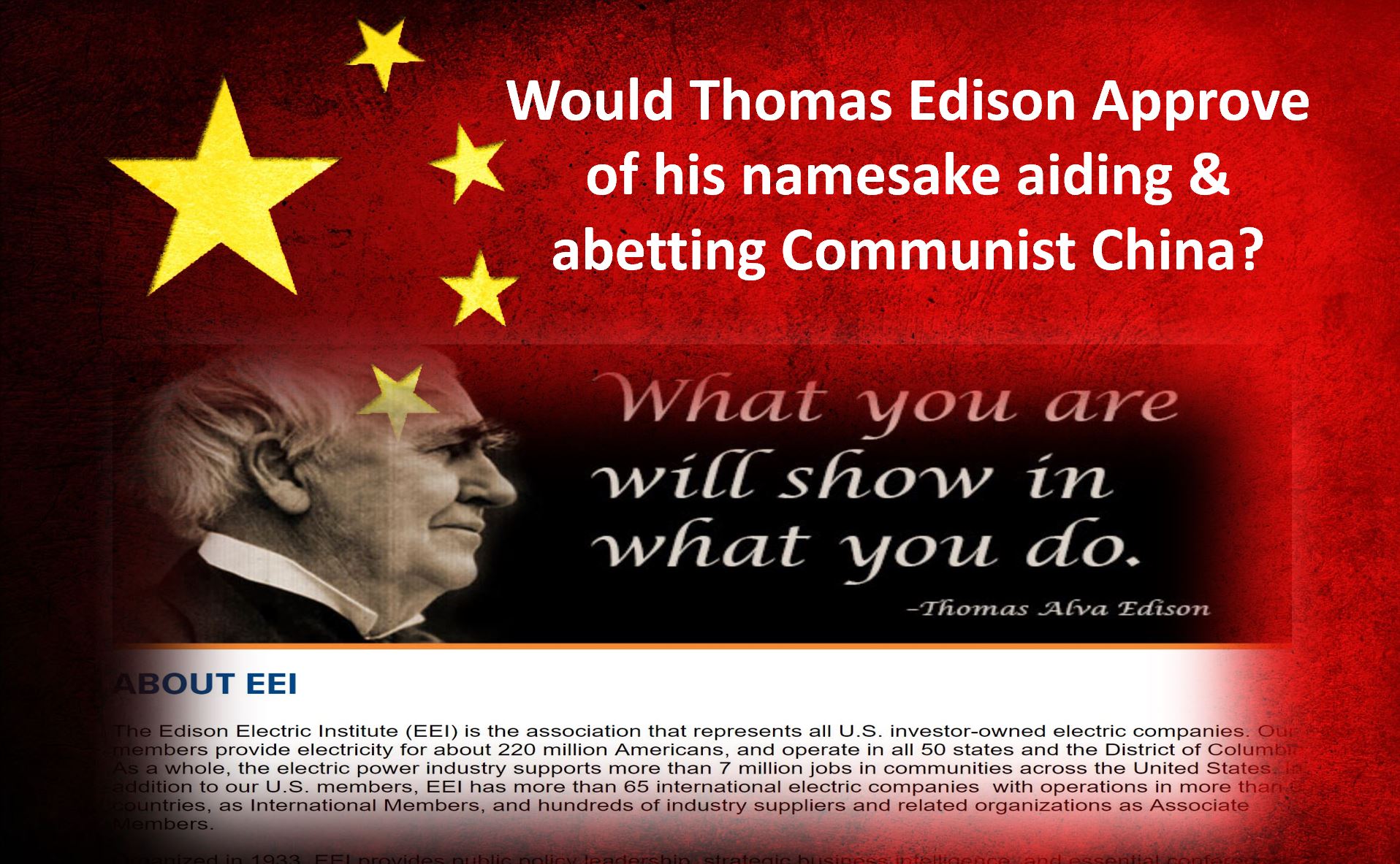Is Edison Electric Institute Helping China Lobby For Less Grid Security?
Edison Electric Institute’s Members Include State Owned Chinese Companies
The Edison Electric Institute (EEI), according to their website, is the trade association that represents all U.S. investor-owned electric companies. Let’s start with Exhibit A—The Edison Electric Institute’s May 2019 member list. You will note on page 3 the names of three Chinese “members” of Edison Electric Institute:
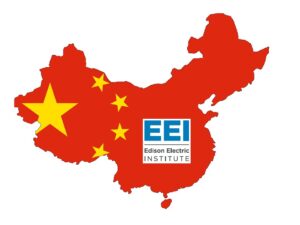
China Southern Power Grid Co. and State Grid Corporation of China are owned by the government of the People’s Republic of China. Power Assets Holdings is a Hong Kong company (which China calls “Hong Kong Special Administrative Region of the People’s Republic of China.”)
In other words, the government of China—the very government that has been hacking the North American electric grid for years—is a member of Edison Electric Institute.
These three Chinese companies have an obligation under the 2017 Chinese National Intelligence Law to “support, assist and cooperate with the state intelligence work.” Moreover, under China’s 2014 Counter-Espionage Law a company may not refuse the Chinese government when asked for information. In fact, according Dr. Murray Scot Tanner’s Lawfare Institute analysis:
“The Intelligence Law, by contrast, repeatedly obliges individuals, organizations, and institutions to assist Public Security and State Security officials in carrying out a wide array of ‘intelligence’ work. Article Seven stipulates that ‘any organization or citizen shall support, assist, and cooperate with state intelligence work according to law.’ Article 14, in turn, grants intelligence agencies authority to insist on this support: ‘state intelligence work organs, when legally carrying forth intelligence work, may demand that concerned organs, organizations, or citizens provide needed support, assistance, and cooperation.’ Organizations and citizens must also protect the secrecy of ‘any state intelligence work secrets of which they are aware’.”
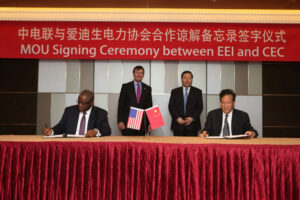
So, at least three members of the Edison Electric Institute have an obligation to provide information and assistance to the government of the People’s Republic of China.
Chinese companies have been “affiliates” of EEI since at least 2014 and State Grid Corporation of China has been a member of EEI since at least 2016. (Click HERE for EEI’s February 2016 Member List.) The relationship seems far from casual: In June of 2018 EEI awarded State Grid Corporation of China “Edison Electric Institute’s (EEI’s) 2018 International Edison Award.” And, EEI and the China Electricity Council (whose “President Member” is the State Grid Corporation of China) have even entered into a formal “memorandum of understanding.“
Yet, somehow the Edison Electric Institute (with its communist Chinese members) lobbies on security measures for the North American electric grid—an activity with clear U.S. national security implications.
Why is America allowing this to happen?
Edison Electric Institute Lobbies on Behalf of Its Members—Which Includes the Chinese Government
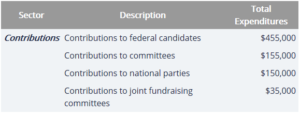
According to the Center for Responsive Politics, in 2018 Edison Electric Institute made $455,000 in political donations to members of the U.S. House of Representatives and U.S. Senate (see the breakdown of who got what HERE).
In fact, Edison Electric Institute—a lobbying group whose dues-paying members include government-owned Chinese companies—contributed $795,000 into our political process in 2018 in political contributions alone. In addition to the contributions, EEI had total lobbying expenditures of $8,109,166 in 2018. While it may be flattering to think that the People’s Republic of China cares so deeply about the American political process, there is a big problem: Edison Electric Institute has taken lobbying positions opposing stronger security for the North American Electric Grid. Would we allow the government of China to fund attempts to thwart stronger security for North American Electric Grid?
Uhhhh…looks like we did.
Edison Electric Institute Obstructs Grid Cybersecurity
EEI has fought efforts to increase the grid’s cybersecurity protections. When looking at an EEI position, what we have found useful in our analysis is asking the question “what would China do?”
For example, in FERC Docket RM17-13-000 The Edison Electric Institute in their filing:
- Objected to FERC’s proposal to shorten the implementation period for the new cybersecurity supply chain risk management requirements.
- Objected to FERC’s proposal that the new Critical Infrastructure Protection (CIP) standards apply to Electronic Access Control or Monitoring Systems (“EACMS”)
Another example is FERC Docket RM18-2-000 in which Edison Electric Institute in their filing:
- Opposed Critical Infrastructure Protection (CIP) standard modifications to address malware detection, mitigation, and removal.
- Opposed more stringent Cyber Security Incident reporting.
- Opposed adding “attempted compromise” to the cybersecurity reporting system.
- Opposed further threat information sharing with additional federal agencies.
It is well known that malware presents a threat to the elecrtic grid as well as other critical infrastructures. As Admiral Mike Rogers (then commander of the U.S. Cyber Command and director of the National Security Agency) testified in 2014:
“There has been a lot of talk over the years about hypothetical dangers of a cyber Pearl Harbor, and it’s certainly become a bit of a cliché in cybersecurity circles. I would argue, however, that the threat of a catastrophic and damaging cyberattack in the United States critical infrastructure like our power or financial networks is actually becoming less hypothetical every day.”
But you read that correctly. The Edison Electric Institute opposes stronger grid security standards, including standards for malware detection, mitigation and removal standards for the electric grid. What would China do?
Exactly.
EEI and Friends Have Engaged in a Soviet Style Disinformation Campaign on EMP
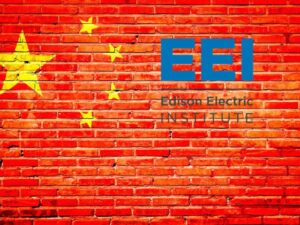 The Edison Electric Institute long cautioned us—as well as Congress and regulators—that we should not act on the existential threat of electromagnetic pulse (EMP), but should instead wait for the fabled Electric Power Research Institute (EPRI) Report. In fact, this dangerous attitude is exemplified by the testimony of Scott Aaronson, Vice President for Security and Preparedness at the Edison Electric Institute. Regarding the threat of EMP he actually said the following in open hearing:
The Edison Electric Institute long cautioned us—as well as Congress and regulators—that we should not act on the existential threat of electromagnetic pulse (EMP), but should instead wait for the fabled Electric Power Research Institute (EPRI) Report. In fact, this dangerous attitude is exemplified by the testimony of Scott Aaronson, Vice President for Security and Preparedness at the Edison Electric Institute. Regarding the threat of EMP he actually said the following in open hearing:
“But sound policy must be based on sound science. And it is for that reason that we appreciate the work of Electric Power Research Institute and North American Electric Reliability Corporation which informs industry as we pursue the right investments and operating posture to appropriately protect the energy grid.”
(February 27, 2019, U.S. Senate Committee on Homeland Security & Governmental Affairs, Hearing: “Perspectives on Protecting the Electric Grid from an Electromagnetic Pulse or Geomagnetic Disturbance.“)
Mr. Aaronson, did you actually just use the phrase “sound science” in the same sentence as “Electric Power Research Institute”? Well, we guess EPRI would be cutting edge state policy “science” in the People’s Republic of China. More importantly, EEI here is trying to lobby for a position of further study of the EMP problem, rather than taking action—action being the position which Senator Ron Johnson clearly favors. Thus, an example of EEI lobbying Congress on a national security issue.
In April, the EPRI report finally came out and, as expected, severely downplays the threat of EMP. Read our analysis HERE.
Moreover, EEI and EPRI have together engaged in a Soviet style disinformation campaign in an attempt to downplay threats to the electric grid, specifically EMP.
- EPRI announced its conclusion that EMP was not a threat to the grid at the beginning of their study period and then conducted the study to support their conclusion. On December 19, 2017 EPRI issued a press release downplaying the EMP threat. This was at the start of their “EMP study.” The “report” issued in April of 2019 mirrored EPRI’s early conclusion.
- In a paper dated February 2015, EEI made a number of representations about the phenomenon of electromagnetic pulse (EMP) and its implications for the grid that were dangerously misleading. In the interest of correcting what EEI characterizes as “myths and facts,” the Secure the Grid Coalition—a group of scientists, engineers, national security practitioners, legislators and other leaders in this field—offered a detailed and fact-checked rebuttal: Read it HERE. Interestingly, since the Secure the Grid Coalition published it’s “fact check” rebuttal to EEI’s misinformation, EEI has since scrubbed their document from their website. Fear not, we have included the original document here: Misleading EEI Document.
What would China (or the former Soviet Union) do?
Exactly.
EEI Is Fighting Efforts to Bring Transparency to NERC’s Regulatory Scheme
Now turning to the great Critical Infrastructure Protection (CIP) standard coverup that the Secure The Grid Coalition has been investigating for over a year. Oddly enough, EEI has entered the fight arguing that the names of companies that violate Critical Infrastructure Protection (CIP) standards should be withheld from the public in every case, forever!
Can you even think of a country where something like that even happens? A country where its people are kept in the dark about threats? A country where its people are fed a constant stream of misinformation?
Oh yeah. The People’s Republic of China.
Conclusion
Is most everything that the Edison Electric Institute has done to thwart efforts to protect the grid consistent with the question: “What would China do?” It sure appears that way.
If you are a Senator or Representative who has ever taken money from the Edison Electric Institute—whose membership includes (since at least 2016) the government of the People’s Republic of China—you should give the money back immediately. Not sure if you did? Here’s the list from 2018 (Information from The Center for Responsive Politics):
| Recipient | Total |
|---|---|
| Amodei, Mark (R-NV) | $1,000 |
| Barton, Joe (R-TX) | $2,500 |
| Bilirakis, Gus (R-FL) | $4,500 |
| Bishop, Mike (R-MI) | $4,000 |
| Brady, Kevin (R-TX) | $10,000 |
| Brown, Anthony (D-MD) | $1,000 |
| Buchanan, Vernon (R-FL) | $1,000 |
| Bustos, Cheri (D-IL) | $2,500 |
| Cardenas, Tony (D-CA) | $2,000 |
| Carter, Buddy (R-GA) | $4,000 |
| Clarke, Yvette D (D-NY) | $7,500 |
| Clyburn, James E (D-SC) | $10,000 |
| Cole, Tom (R-OK) | $1,000 |
| Collins, Chris (R-NY) | $2,500 |
| Comstock, Barbara (R-VA) | $2,000 |
| Costa, Jim (D-CA) | $5,000 |
| Costello, Ryan (R-PA) | $1,000 |
| Crowley, Joseph (D-NY) | $2,500 |
| Cuellar, Henry (D-TX) | $1,000 |
| Curbelo, Carlos (R-FL) | $2,500 |
| Curtis, John (R-UT) | $1,000 |
| Denham, Jeff (R-CA) | $3,500 |
| Dingell, Debbie (D-MI) | $2,500 |
| Donovan, Dan (R-NY) | $1,000 |
| Doyle, Mike (D-PA) | $5,000 |
| Duffy, Sean P (R-WI) | $2,000 |
| Faso, John (R-NY) | $1,000 |
| Frelinghuysen, Rodney (R-NJ) | $2,000 |
| Gallagher, Mike (R-WI) | $2,000 |
| Griffith, Morgan (R-VA) | $5,000 |
| Guthrie, Brett (R-KY) | $2,000 |
| Harper, Gregg (R-MS) | $1,000 |
| Higgins, Brian M (D-NY) | $1,000 |
| Hoyer, Steny H (D-MD) | $10,000 |
| Hudson, Richard (R-NC) | $4,000 |
| Hultgren, Randy (R-IL) | $2,500 |
| Hurd, Will (R-TX) | $7,500 |
| Johnson, Bill (R-OH) | $5,000 |
| Johnson, Mike (R-LA) | $1,000 |
| Kaptur, Marcy (D-OH) | $2,500 |
| Katko, John (R-NY) | $4,000 |
| Kennedy, Joe III (D-MA) | $2,500 |
| Kind, Ron (D-WI) | $2,000 |
| Kinzinger, Adam (R-IL) | $4,500 |
| LaHood, Darin (R-IL) | $2,000 |
| LaMalfa, Doug (R-CA) | $1,000 |
| Lance, Leonard (R-NJ) | $4,000 |
| Latta, Robert E (R-OH) | $5,000 |
| Lawrence, Brenda (D-MI) | $2,500 |
| Lesko, Debbie (R-AZ) | $2,500 |
| Loebsack, David (D-IA) | $2,000 |
| Long, Billy (R-MO) | $1,000 |
| Luetkemeyer, Blaine (R-MO) | $5,000 |
| Lujan, Ben Ray (D-NM) | $7,500 |
| MacArthur, Thomas (R-NJ) | $2,000 |
| Matsui, Doris O (D-CA) | $3,000 |
| McCarthy, Kevin (R-CA) | $7,500 |
| McHenry, Patrick (R-NC) | $5,000 |
| McKinley, David (R-WV) | $3,500 |
| McNerney, Jerry (D-CA) | $3,500 |
| Meehan, Patrick (R-PA) | $2,000 |
| Miller, Carol (R-WV) | $1,000 |
| Mullin, Markwayne (R-OK) | $5,000 |
| Neal, Richard E (D-MA) | $5,000 |
| Norcross, Don (D-NJ) | $2,500 |
| Nunes, Devin (R-CA) | $2,000 |
| O’Halleran, Tom (D-AZ) | $1,000 |
| Olson, Pete (R-TX) | $4,500 |
| Pallone, Frank Jr (D-NJ) | $5,000 |
| Panetta, Jimmy (D-CA) | $1,000 |
| Paulsen, Erik (R-MN) | $4,000 |
| Peters, Scott (D-CA) | $5,000 |
| Pocan, Mark (D-WI) | $2,000 |
| Ratcliffe, John Lee (R-TX) | $1,000 |
| Reed, Tom (R-NY) | $6,500 |
| Rice, Tom (R-SC) | $4,500 |
| Richmond, Cedric (D-LA) | $5,000 |
| Rodgers, Cathy McMorris (R-WA) | $3,000 |
| Roskam, Peter (R-IL) | $5,000 |
| Ruppersberger, Dutch (D-MD) | $2,000 |
| Rush, Bobby L (D-IL) | $2,500 |
| Scalise, Steve (R-LA) | $7,500 |
| Schrader, Kurt (D-OR) | $1,000 |
| Sewell, Terri A (D-AL) | $1,000 |
| Shimkus, John M (R-IL) | $5,000 |
| Shuster, Bill (R-PA) | $2,500 |
| Simpson, Mike (R-ID) | $5,000 |
| Smith, Jason (R-MO) | $4,500 |
| Stivers, Steve (R-OH) | $6,000 |
| Swalwell, Eric (D-CA) | $2,000 |
| Thompson, Bennie G (D-MS) | $2,000 |
| Thompson, Mike (D-CA) | $2,000 |
| Thornberry, Mac (R-TX) | $1,000 |
| Tiberi, Pat (R-OH) | $2,500 |
| Tonko, Paul (D-NY) | $4,000 |
| Upton, Fred (R-MI) | $10,000 |
| Valadao, David (R-CA) | $2,000 |
| Visclosky, Pete (D-IN) | $4,000 |
| Wagner, Ann L (R-MO) | $1,000 |
| Walberg, Tim (R-MI) | $5,000 |
| Walden, Greg (R-OR) | $5,000 |
| Walorski, Jackie (R-IN) | $5,000 |
| Walters, Mimi (R-CA) | $2,000 |
| Welch, Peter (D-VT) | $1,000 |
| Womack, Steve (R-AR) | $2,000 |
| Yoder, Kevin (R-KS) | $1,000 |
